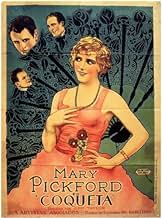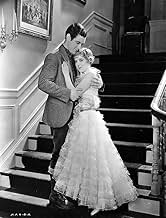IMDb RATING
5.5/10
2.4K
YOUR RATING
A flirtatious Southern belle is compromised with one of her suitors.A flirtatious Southern belle is compromised with one of her suitors.A flirtatious Southern belle is compromised with one of her suitors.
- Won 1 Oscar
- 3 wins total
Johnny Mack Brown
- Michael Jeffery
- (as John Mack Brown)
Jay Berger
- Little Boy on Street
- (uncredited)
Phyllis Crane
- Bessie
- (uncredited)
Joseph Depew
- Joe
- (uncredited)
Robert Homans
- Court Bailiff
- (uncredited)
Dorothy Irving
- Girl
- (uncredited)
Vera Lewis
- Miss Jenkins
- (uncredited)
Craig Reynolds
- Young Townsman at Dance
- (uncredited)
Storyline
Did you know
- TriviaMary Pickford was initially horrified to hear her recorded voice for the first time in this film: "That's not me. That's a pipsqueak voice. It's impossible! I sound like I'm 12 or 13!"
- Quotes
Jasper Carter: Did Michael Jeffery make love to you there?
Norma Besant: Yes.
Jasper Carter: Did you resist him?
Norma Besant: Yes.
Jasper Carter: But he forced his attention?
Norma Besant: Yes.
Jasper Carter: And you could not resist his lovemaking?
Norma Besant: No.
Jasper Carter: And he made you yield?
Norma Besant: Yes.
Jasper Carter: He made you yield to an extreme?
Norma Besant: Yes.
- ConnectionsEdited into American Experience: Mary Pickford (2005)
Featured review
The chief flaw of Coquette is the generally poor quality of the sound which sometimes fades entirely, making it difficult to follow the plot which is propelled mostly by spoken exposition as opposed to purely cinematic techniques. The play on which it is based was a hit for Helen Hayes on Broadway but was sanitized and oversimplified for the screen (not at all unusual in those days). Dialogue and acting are florid and broad but nevertheless the story does manage to hold the attention. A doctor's daughter (Mary Pickford) outrages her tradition- bound father (John St. Polis) by falling in love with an uncultivated fellow from "the hills" (John Mack Brown). A fatal shooting results, but I won't give away the exact circumstances here.
Although she was in her mid-30's at the time of filming, Pickford is convincing, if somewhat mannered, as the maiden with one foot still in girlhood, displaying wide emotional range and a masterful command of her body, no surprise considering the physicality of her long silent film career. Her diminutive stature also works in her favor. When she sits in the maid's lap for consolation she really does look like the little girl she had played for so many years. Sadly, she is made to spend a great deal of time sobbing hysterically. (Vivien Leigh had to deal with the same requirement in Gone with the Wind ten years later.) Although not much of an actor, John Mack Brown has a kind of animal appeal, with a relatively deep, strong voice which registers clearly; one can understand why he became a popular player in talking films. Here, he seems to seesaw between menace and tenderness and you just have to give him the benefit of the doubt. Otherwise you cannot believe Pickford's feelings towards him. St. Polis has a stately presence and a sonorous, trained voice and seems the most comfortable of the supporting players in his role. The character of the black maid played by Louise Beavers departs from the norm; she moves torpidly and even talks back to the master's teenage son when he tries to rush her through her chores.
There is a lively scene at a country club featuring a jazz band and young revelers stomping to the hotsy-totsy musical numbers with wild abandon, suggesting that the later jitterbug and sixties dances did not come out of nowhere. The courtroom climax is hard to swallow did judges in the South or anywhere else ever allow witnesses to sit in the laps of defendants for long personal dialogues while on the stand?
Although she was in her mid-30's at the time of filming, Pickford is convincing, if somewhat mannered, as the maiden with one foot still in girlhood, displaying wide emotional range and a masterful command of her body, no surprise considering the physicality of her long silent film career. Her diminutive stature also works in her favor. When she sits in the maid's lap for consolation she really does look like the little girl she had played for so many years. Sadly, she is made to spend a great deal of time sobbing hysterically. (Vivien Leigh had to deal with the same requirement in Gone with the Wind ten years later.) Although not much of an actor, John Mack Brown has a kind of animal appeal, with a relatively deep, strong voice which registers clearly; one can understand why he became a popular player in talking films. Here, he seems to seesaw between menace and tenderness and you just have to give him the benefit of the doubt. Otherwise you cannot believe Pickford's feelings towards him. St. Polis has a stately presence and a sonorous, trained voice and seems the most comfortable of the supporting players in his role. The character of the black maid played by Louise Beavers departs from the norm; she moves torpidly and even talks back to the master's teenage son when he tries to rush her through her chores.
There is a lively scene at a country club featuring a jazz band and young revelers stomping to the hotsy-totsy musical numbers with wild abandon, suggesting that the later jitterbug and sixties dances did not come out of nowhere. The courtroom climax is hard to swallow did judges in the South or anywhere else ever allow witnesses to sit in the laps of defendants for long personal dialogues while on the stand?
- How long is Coquette?Powered by Alexa
Details
Box office
- Budget
- $489,106 (estimated)
- Runtime1 hour 16 minutes
- Color
- Aspect ratio
- 1.20 : 1
Contribute to this page
Suggest an edit or add missing content



































